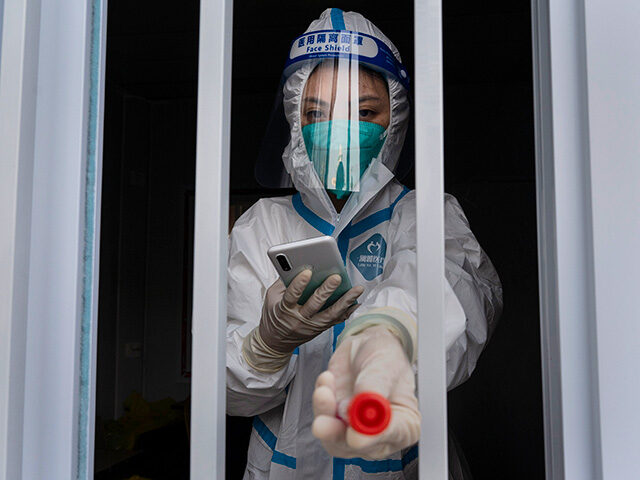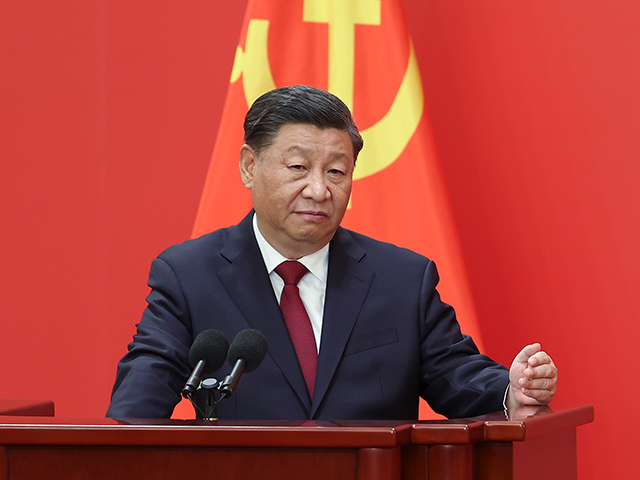China’s National Health Commission (NHC) announced a “sweeping and more vigorous than ever” campaign against corruption in Chinese health care this week, allegedly intended to eradicate widespread bribery and kickback schemes in medicine, the pharmaceutical industry, and academia.
The announcement followed mounting public outrage over sensational expenditures allegedly intended to combat the Wuhan coronavirus pandemic, such as the construction of massive “makeshift hospitals” that now sit largely unused. Chinese state media, acknowledging concerns about the hospitals in early August, admitted that some regional governments still have plans to build them, even though China ended its pandemic emergency in December.
China has also seen a growing number of protests over the Communist Party, desperately seeking to save funds after the lavish expenditures of the “zero-Covid” era, dramatically cutting healthcare benefits to seniors. China reportedly spent $975 billion in health care in 2022, then proceeded to limit healthcare benefits for the elderly in the beginning of this year. Thousands of elderly Chinese joined the “white hair movement” against the communists in protests in February, most of them convening in the origin city of the coronavirus, Wuhan, and the seaside resort city of Dalian.
The press conference on Tuesday intended to announce an “unprecedented anti-corruption storm” in medicine, according to China’s government propaganda newspaper the Global Times. The NHC explained that it had launched a campaign of top-down inspections of hospitals, clinics, and local health care officers to investigate “numerous reports of fallen officials.” Another nine agencies within the Chinese Communist Party’s totalitarian regime will be involved in the persecution of health workers and administrators in the system, the NHC announced.
The Beijing-based NHC said it would be investigating six types of corruption including “medical institutions engaging in ‘kickback sales’ of drugs and devices, as well as the improper use of medical insurance funds, stressing that the pharmaceutical field is the ‘main battleground.'”
RELATED VIDEO — Metzl: Scientists Falsely Attacked Lab Theory to Protect Scientific Collaboration with China, Avoid Siding with GOP:
“Medical corruption may occur in the entire process, from listing, bidding, procurement, to usage and payment,” the Global Times detailed.
“Kickbacks,” or excess payments to doctors and other health workers in exchange for access to health care contracts, was listed as a primary preoccupation. The Global Times accused doctors, for example, of taking kickback bribes from academic and financial institutions in the form of outsized payments in exchange for participation in scientific conferences or other academic events.
“What needs to be remedied is the illegal behavior of fabricating academic conferences out of thin air, carrying out illegal benefits transmission, or illegally sharing the sponsorship fees of academic conferences,” the state newspaper, citing NHC officials, specified.

Workers in protective overalls walk past the Hankou railway station on April 7, 2020, in central China’s Hubei province. (Ng Han Guan/AP Photo)
“Additionally, the procurement of large medical equipment is another hotbed of corruption,” the Global Times continued. “In May, China’s anti-corruption body exposed a hospital chief in Southwest China’s Yunnan Province for receiving 16 million yuan in bribes for buying a medical accelerator worth 15 million yuan.”
The state newspaper also suggested that pharmaceutical companies manufacturing vaccines bribe doctors to ensure that health centers use their products.
The campaign to purge “corrupt” health officials will last at least one year, according to the NHC. The Communist Party has identified “at least 176 Party secretaries or heads of hospitals” under investigation for corruption as of Saturday, the Global Times detailed.
Corruption purges have long been a staple of communist regimes around the world. In China, dictator Xi Jinping has revived Mao-era purges on a large scale, making one of his first acts in office in 2014 the launch of a “mass line” campaign to “trigger significant discipline reforms within the party.” Xi prioritized the revamping of the Central Commission for Discipline Inspection (CCDI), a Mao-era ideological purity enforcement institution, and has used it to ensure all those with power in the Communist Party are fiercely loyal to him. The result has been significant reforms to Chinese law that will allow Xi to remain in power indefinitely; Xi was “unanimously” “reelected” to the presidency of the country most recently in March.
The focus on “discipline” within the medical field follows growing disgruntled sentiment among Chinese people regarding the extreme expenses incurred during the Wuhan coronavirus pandemic. In particular, the Global Times observed complaints on heavily censored Chinese social media sites regarding the ongoing construction of “makeshift hospitals.” Many of the buildings, rapidly constructed throughout 2020 and used for propaganda purposes, are no longer of use as China is reportedly not experiencing a surge in coronavirus hospitalizations.
“Multiple places across China have noted that local makeshift hospitals constructed during the [Wuhan coronavirus] pandemic remain idle,” the Global Times reported on August 7. “These announcements come after plans to construct a makeshift hospital in Jiamusi, Northeast China’s Heilongjiang Province have provoked a storm on social media.”
In Heilongjiang, locals “questioned the necessity of the project since many makeshift hospitals across the country are actually being demolished,” the outlet observed. Local officials claimed that the funds had been earmarked for the hospital before nationwide protests forced Beijing to end lockdown and quarantine measures last year and attempted to subdue outrage by claiming the money would “actually be used in the construction of tourism projects and hotels.”
Other officials contradicted these reports, leaving the impression that the government merely hoped to keep the money by any means.
While the Global Times and other Chinese government mouthpieces have attempted to redirect outrage toward local government officials, the NHC was boasting of spending millions on the construction of “permanent” quarantine sites as recently as May 2022, insisting the “zero-Covid” policy of city-wide lockdowns and mass imprisonment in quarantine camps was the only reasonable approach towards the pandemic.


COMMENTS
Please let us know if you're having issues with commenting.